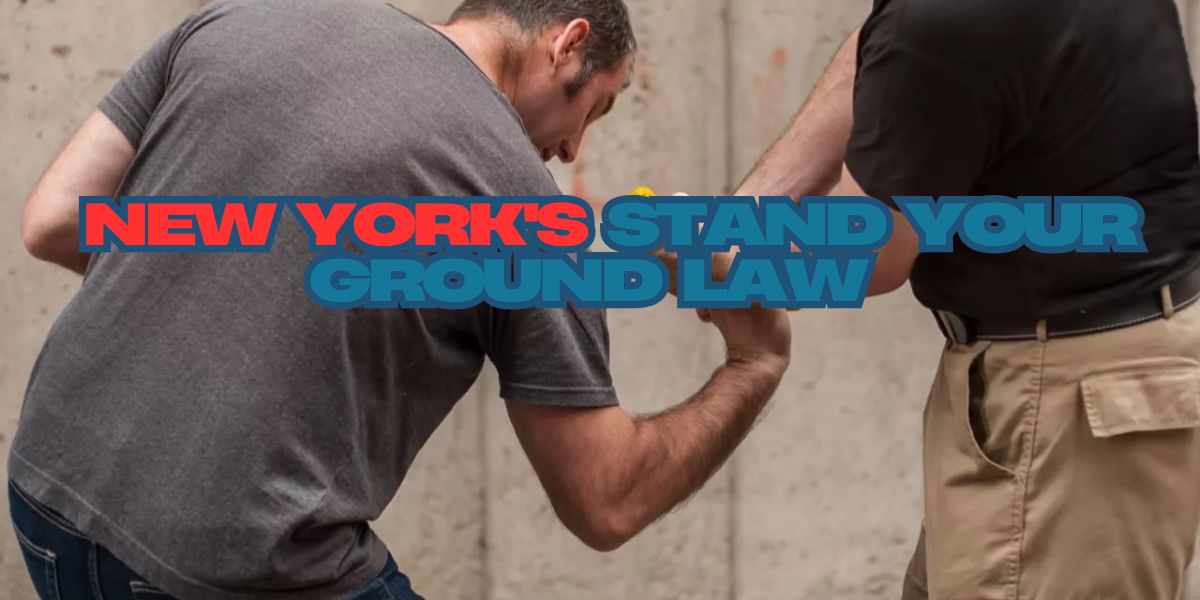New York State’s approach to self-defense law has often raised questions, particularly around the idea of “Stand Your Ground.”
Many people are familiar with this concept, particularly in states where it is commonly referenced in legal cases, but the application of “Stand Your Ground” in New York differs from the more expansive laws in some other parts of the United States.
This article takes a closer look at New York’s self-defense laws, clarifying what “Stand Your Ground” means in the state and how it is applied.
What Is the Stand Your Ground Law?
The “Stand Your Ground” law, in its broadest sense, allows individuals to use force, including deadly force, to defend themselves if they feel threatened, without the obligation to retreat first. Some states, such as Florida and Texas, have widely known Stand Your Ground laws that remove the duty to retreat from any situation where an individual feels they are under imminent threat of harm or death.
However, New York does not have a specific Stand Your Ground statute in the same way that some other states do. Instead, New York law addresses self-defense and the use of force in defense of oneself through more traditional self-defense provisions, including the Castle Doctrine and the general use-of-force statutes. These laws do not specifically eliminate the duty to retreat, but they do allow individuals to act in self-defense in certain circumstances.
New York’s Self-Defense Laws: The Castle Doctrine
New York’s self-defense laws are rooted in the Castle Doctrine, which allows individuals to use force—up to deadly force—when they are defending themselves within their homes. In New York, the Castle Doctrine makes it clear that an individual does not have a duty to retreat if they are attacked in their own home. This principle extends the right to protect oneself to one’s place of residence.
The law acknowledges that a person’s home is their sanctuary, and when confronted with an intruder, they have the right to defend themselves without having to first attempt to flee. However, this protection is not absolute, and the force used must still be reasonable in relation to the threat posed by the attacker.
The Duty to Retreat in Public Spaces

When it comes to encounters outside of one’s home, New York’s laws follow a different principle. Unlike Stand Your Ground states, New York imposes a duty to retreat when possible. This means that if an individual is faced with an imminent threat outside of their home, they are expected to avoid violence by retreating if they can do so safely.
However, there are exceptions to this duty. If an individual cannot retreat safely or if the retreat would place them in greater danger, they may be justified in using force, including deadly force, in defense of themselves. For instance, if an attacker is armed and the individual cannot escape or seek help, they may be permitted to stand their ground and use force to defend themselves.
The Use of Deadly Force
2025 Brings New Laws That Could Hit Your Wallet—Important Updates for Large Families
In both the home and public spaces, the law specifies that deadly force may only be used if the individual reasonably believes they are in imminent danger of death or serious injury. This is a critical point: the right to use deadly force in New York is not unlimited and must be supported by a clear and immediate threat.
In assessing the reasonableness of the use of force, the courts will consider the specific circumstances, including the severity of the threat and the individual’s ability to retreat. If the response was disproportionate to the danger, the person using force may face legal consequences, including charges of assault or even murder if the act is deemed unjustified.
The Legal Implications of New York’s Self-Defense Laws
The consequences of invoking self-defense in New York can be significant, as it plays a central role in whether a defendant will be convicted or acquitted in cases involving violence. If someone is accused of using excessive force or initiating an altercation, the court will examine whether their actions were reasonable under the circumstances.
For example, if an individual is confronted with a potential threat but escalates the situation without sufficient cause, their claim of self-defense may be rejected. Similarly, a claim of self-defense will not be upheld if it is found that the individual provoked the attack.
New York’s legal system seeks to strike a balance between protecting individuals’ rights to defend themselves and preventing unnecessary violence. As such, cases involving self-defense are often complex and require careful consideration of all the facts surrounding the incident.
Key Differences Between Stand Your Ground States and New York
The main difference between Stand Your Ground states and New York is that, in the former, individuals are generally not required to retreat, even in public spaces. Stand Your Ground laws essentially grant immunity from prosecution when self-defense is claimed, as long as there was a reasonable belief of danger. In contrast, New York law requires an individual to demonstrate that they did not have an opportunity to retreat safely, unless they are within their own home.
Another critical difference is that in Stand Your Ground states, self-defense is often an affirmative defense that must be proven by the accused. In New York, while self-defense is also a legal defense, the burden of proving that force was used in self-defense is typically on the prosecution once the defense is raised.
Know Your Rights
While New York does not have a formal Stand Your Ground law, the state’s self-defense laws still provide protections for individuals who reasonably believe they are in imminent danger. New Yorkers should be aware of the nuances of these laws, especially the duty to retreat, and recognize that they must act reasonably in situations involving potential threats.
As always, the use of force, especially deadly force, will be scrutinized in any legal proceeding, so it is important to understand your rights and obligations under New York law.
If you are ever in a situation where you feel threatened, it’s crucial to assess the circumstances carefully and, if possible, try to avoid violence or retreat. When in doubt, seeking legal counsel is always a prudent step in understanding how the law applies to specific situations.
























+ There are no comments
Add yours